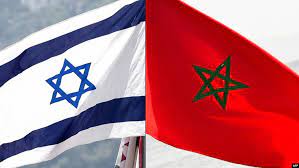Morocco, the United States and Israel, on Wednesday, celebrated the first anniversary of the Tripartite Agreement, signed on December 22, 2020 in Rabat, paving the way for fruitful cooperation between the three countries.
The commemoration brought together the Moroccan, American and Israeli Foreign ministers, in a tripartite video conference to mark the agreement that sealed the resumption of relations between Morocco and Israel under the auspices of the United States.
In his speech, the U.S. Secretary of State, Antony Blinken, on Wednesday, described the agreement as a diplomatic success reached a year ago between Morocco, the US and Israel.
Blinken said the deal paves the way for a new era of peace, stability, opportunity and understanding in the region.
The head of U.S. diplomacy recalled that the day after the signing of their joint declaration, Morocco and Israel opened their airspace, “for the first time in decades,” at a rate of ten direct flights per week.
He also said that the kingdom and Israel have reached agreements that facilitate joint military exercises and intensify economic relations, noting that a new Morocco-Israel Business Council has helped create more than 30 partnerships in technology, agriculture, water, textile, health and renewable energy.
Talks are underway to collaborate on desalination projects and create student exchange programs on environmental sustainability, Mr. Blinken added, noting that the two countries have deepened cultural ties so that one million Israelis of Moroccan descent can reconnect with their roots.
It also means that young Moroccan and Israeli athletes can train together.
“These steps are not only positive for Israel and Morocco, they are also positive for the region as a whole,” said the head of U.S. diplomacy, assuring Washington’s readiness to “further expand the circle of peaceful diplomacy.”
Blinken further noted that through the resumption of their relations, Morocco and Israel show the way for other countries to “discuss openly and constructively their common goals and points of disagreement,” seize mutually advantageous opportunities and bring people together in friendship.
“That is why the United States is committed to supporting and expanding the Abraham Accords,” the US’s chief diplomat said.
“We are grateful for your continued efforts to deepen and strengthen ties between two great partners and friends of the United States,” Blinken noted, expressing Washington’s determination to continue “our work together to build a more peaceful and prosperous region.”
Israel’s Foreign Minister Yair Lapid said that Morocco and his country are called to continue to build and strengthen their bilateral ties.
“We must continue to build, find new initiatives and strengthen our bilateral ties,” the head of Israeli diplomacy said.
“We are celebrating a year of renewed peace between old friends. The ties between our peoples are deep and relations between our countries are stronger than ever,” he said, stressing that “we are now establishing closer relations between peoples and between economic actors with a view to deeper strategic cooperation.”
The Moroccan Minister of Foreign Affairs, Nasser Bourita stressed that the tripartite declaration, which is not under the seal of the Abrahamic agreements, is a “renewed promise” between the three countries, a promise articulated in the three Ps namely peoples, partnership and peace.
For him, understanding between peoples is symbolized by the fact that a million Israelis of Moroccan extraction have been able to renew their ties with their country of origin following the Rabat-Tel Aviv rapprochement.
The minister noted, however, that this rapprochement can be considered “a real success” when tourists “can travel and easily discover the enormous cultural potential of our respective countries.”
According to Bourita, peace is first and foremost synonymous with the resolution of the Sahara conflict.
It is in this sense that he welcomed the tripartite agreement of December 2020 as “a true message of peace” through the “strengthening of Moroccan sovereignty over the Sahara” that the agreement conveys.
Peace also covers the Middle East and the resolution of the Israeli-Palestinian conflict.
The Moroccan-US-Israeli agreement is a “valuable tool” that can contribute to peace in the Middle East, he added, recalling that King Mohammed VI is, as chairman of the Al Quds Committee, an advocate of the unique and sacred aspect of Al Quds as a city of peace.
He concluded that “if there is one thing the past year has taught us, it is that peace is always worth working for.
“Together, we form a protective wall that safeguards our common interests and values. We are pleased with the initial achievements of our joint venture. However, we also remain humble and lucid.
“For all these reasons, Morocco fully reaffirms its commitment to a future we can shape together”.
HA/fss/as/APA


